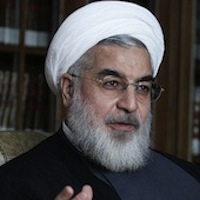Bill Humphrey (yours truly) for The Globalist magazine, June 20, 2013, just after the surprise election of Hassan Rouhani as President of Iran: “Rohani’s Presidential Pulpit” —
The Iranian people and the hard-line theocrats alike support nuclear development as a matter of sovereignty and independence from Western interference. But they also recognize that belligerency on the issue has brought only misery and the constant risk of attack. Now would be a good time for a conciliatory approach and a fresh start in nuclear talks with the West.
Hassan Rohani seems to be the man for the job of resetting Iran’s foreign image and stance. He can thread the high-stakes needle of being diplomatic and open to compromise while also standing firmly (but not aggressively) behind a civilian nuclear development program.
[…]
If Rohani wants to have a big impact as Iran’s president, his best bet is to use the power of rhetoric to re-shape Iran’s global and regional posture. In doing so, he could ease the pressure of sanctions and spare Iran from war. That’s where he can make a big difference.
If a disempowered fanatical blowhard can, with the power of his speeches alone, make Iran appear to be an imminent horseman of the nuclear apocalypse, then a disempowered reformist who wants reconciliation with the West can use friendlier rhetoric to climb Iran back down off the ledge.
There were a lot of naysayers at the time who were saying that President-elec Rouhani couldn’t possibly change things, either in Iran or with how the P5+1 countries were reacting to Iran. Obviously he’s not solely responsible for the shift; a lot of the internal credit for that goes to Ayatollah Ali Khamenei himself. And the negotiations hinged on the skill of Javad Zarif, appointed by Rouhani to be Foreign Minister, reinforcing Rouhani’s other positive role (assembling a negotiating team that didn’t constantly blow up the talks like the previous teams).
 But my analysis centered more narrowly on the role that calmer and reframed rhetoric could play in tamping down tensions and climbing “Iran back down off the ledge” that Rouhani’s predecessor Ahmadinejad had helped put it on. Careful and precise political communication, as I suggested then that it could, was indeed able to transcend some of the official political landscape (at home and abroad) and bring the powers and Iran close enough together to find a way toward a deal.
But my analysis centered more narrowly on the role that calmer and reframed rhetoric could play in tamping down tensions and climbing “Iran back down off the ledge” that Rouhani’s predecessor Ahmadinejad had helped put it on. Careful and precise political communication, as I suggested then that it could, was indeed able to transcend some of the official political landscape (at home and abroad) and bring the powers and Iran close enough together to find a way toward a deal.
As much as I’m a procedural analyst — something which also helps me see impending developments many other U.S. commentators miss — I think that kind of intangible and procedure-overriding adroitness tends to be overlooked as well.
And now another shameless plug for my 2012 book on the presidential nomination acceptance speeches at the Democratic and Republican national conventions, which is also about the redefining power of leader rhetoric. It’s available for download from Amazon for just $2.99!
On to the remainder of the negotiations, to secure a final deal by the end of June. I wish the Iranian people all the best, so that they can live in peace and prosperity — and eventually re-take their rightful place among the great and enlightened nations of the world.
من یک عشق بزرگ برای مردم ایران است


